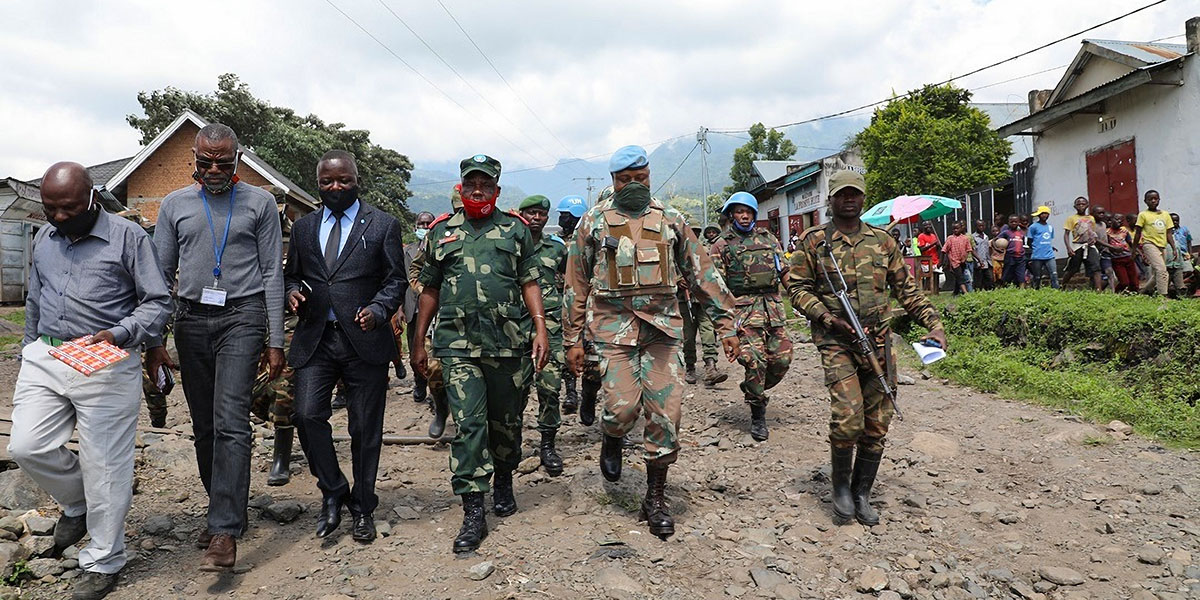Out of a total of 26 provinces, 23 have been affected by COVID-19. Kinshasa, the capital city, has recorded more than twenty thousand COVID-19 cases. The number of cases and deaths in the DRC is much lower than the case-load and losses reported in other parts of the world, such as in South Africa or the United States of America (USA).
Beyond the impact of #COVID19 on the health system in the #DRC, the pandemic has also generated constitutional, human rights and security challenges @Balingene
Tweet
Institutional confusion in the organisation of pandemic response
Once the first cases of COVID-19 were diagnosed, the government wanted to introduce extraordinary measures to prevent the disease, however questions emerged regarding the legal framework under which such measures can be taken and which institutions had the power to participate in decision-making processes.
On 24 March 2020 the President of the Republic declared a state of emergency. The head of the Senate argued, however, that the constitution of 18 February 2006 required the prior authorisation of Parliament sitting as Congress. In 2007, the Court ruled that the President of the Republic does not need an authorisation by Parliament, whilst in 2019, it approved the rules of the Congress requiring such an authorisation. And in 2020, when President Tshisekedi requested the constitutional review of his decision to declare a state of emergency, the Court found that the Head of State had the option to either decide unilaterally or to request parliamentary authorisation. The Constitutional Court missed an opportunity to clarify how political institutions could work together in the context of exceptional circumstances during which the risk of abuse of power is obvious.
Impact of anti COVID-19 measures on human rights
The DRC is a decentralised and regionalised state. The Central Government coexists with provinces which enjoy political and administrative autonomy, and the measures taken to control the pandemic thus need to be understood in the context of a multi-level system. Overall, the lockdown measures included curfews, the closure of international borders, travel restrictions within the country, the suspension of school and university activities, the prohibition of public gatherings, parties, religious services, and the closure of bars and restaurants. These measures were maintained until the end of the state of emergency on 21 July 2020. But other measures were then adopted, such as the imposition of a new curfew in Kinshasa since 20 December 2020 as a response to the second wave of the pandemic.
It proved difficult for people to respect the lockdown measures in one of the poorest countries in the world. Instead of staying at home, many Congolese had little choice but to go out to find their daily bread, despite the risk to their health and the threat of administrative fines. In order to reduce the impact of the measures taken to prevent the spread of COVID-19, President Tshisekedi created the National Coronavirus Solidarity Fund in April 2020 with the mandate to mobilize financial assistance from donors for the fight against the pandemic and subsequently he launched a Multi-Sector Emergency Program to Mitigate the Effects of COVID-19 in the DRC. All these initiatives remain empty slogans. Donors, such as the USA and China preferred to directly support the Coronavirus Response Body through medical supplies or money transferred to the Government. The reasons are difficult to specify but the DRC is renowned for corruption and the embezzlement of public funds.
There are also questions regarding the suitability of some measures. First, the suspension of church services has been viewed as a violation of the freedom of religion in the sense that it affects the individual right to exercise his religion or to manifest his faith. Second, there seems to be doubts about the legality of some of the exceptional measures taken by provinces outside the framework of the state of emergency declared by the Head of State. Provinces are not allowed to declare their own states of emergency or to take measures that limit human rights beyond the boundaries of the laws.
The pandemic and the conflicts in eastern DRC
According to the Kivu Security Tracker, there are 120 armed groups in the eastern DRC, an area that includes North Kivu, South Kivu, Ituri and Tanganyika. The Congolese army and the UN peacekeeping mission in the DRC (MONUSCO) have the mandate to restore peace through, amongst others, the disarmament of armed groups. Despite their efforts there is still a serious security problem in this part of the DRC, which has affected the efficacy of the response measures taken by the governments against COVID-19. In fact, in those places where the state is not able to exercise its authority, the fight against the pandemic depends on the will of the armed groups.
To sum up, the DRC has faced several challenges during the COVID-19 pandemic, including conflict among state institutions that do not subscribe to the same agenda and priorities. The lack of financial means to reduce the adverse effects of the pandemic on the life of people and the armed conflicts in eastern DRC also affected the efficacy of some measures taken by the government. As a new ruling, the coalition named “Union Sacrée de la Nation” has replaced the previous one between CACH (Cap pour le Changement) and FCC (Front Commun pour le Congo). There is now an opportunity to improve institutional cooperation to stop the pandemic and eradicate armed groups and conflicts in the country. This may also result in the international community increasing its support to the DRC based on improved trust in the new coalition and central government.
Dr Balingene Kahombo, Associate professor of public law and African international relations at the Faculty of Law of the University of Goma (DRC).


